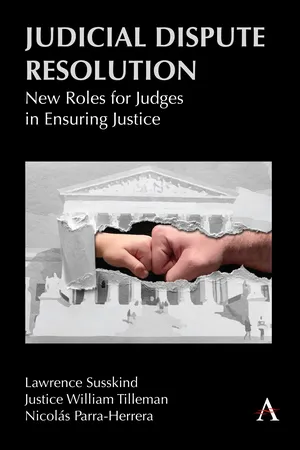
Judicial Dispute Resolution
New Roles for Judges in Ensuring Justice
- English
- ePUB (mobile friendly)
- Available on iOS & Android
Judicial Dispute Resolution
New Roles for Judges in Ensuring Justice
About this book
This book describes the ways in which judges, using JDR, have been facilitating problem-solving among litigants, and in the process, ensuring more just outcomes. JDR or judicial dispute resolution is similar to mediation (or alternative dispute resolution – ADR, as it is sometimes called), but it is provided by a judge, not a private mediator. Very little has been written about JDR, especially in Canada where it has been pioneered for several decades, because all the records have remained confidential. The story can now be told because the authors were given exclusive access to the records and the parties (including the JDR judges) in nine illustrative cases.The authors provide a complete Teaching Appendix summarizing the JDR cases from the standpoint of a variety of legal specialties, while highlighting the differences between JDR and ADR.
Frequently asked questions
- Essential is ideal for learners and professionals who enjoy exploring a wide range of subjects. Access the Essential Library with 800,000+ trusted titles and best-sellers across business, personal growth, and the humanities. Includes unlimited reading time and Standard Read Aloud voice.
- Complete: Perfect for advanced learners and researchers needing full, unrestricted access. Unlock 1.4M+ books across hundreds of subjects, including academic and specialized titles. The Complete Plan also includes advanced features like Premium Read Aloud and Research Assistant.
Please note we cannot support devices running on iOS 13 and Android 7 or earlier. Learn more about using the app.
Information
Table of contents
- Cover
- Half-Title
- Title
- Copyright
- Contents
- Foreword (Justice Russell Brown)
- Acknowledgments
- Chapter 1 Introduction
- Chapter 2 Judicial Dispute Resolution (JDR) around the World
- Chapter 3 The History of JDR in Canada
- Chapter 4 JDR’s Response to the Weaknesses of Litigation
- Chapter 5 ADR v. JDR
- Chapter 6 JDR Produces Satisfactory Results: The Divorce Case
- Chapter 7 Advantages and Disadvantages of JDR
- Chapter 8 Justice and Fairness in JDR: The Motor Vehicle Accident with Pedestrian Case
- Chapter 9 Types of Judges: Skill, Temperament and Attitude in JDR Temperament in an Estate Dispute Case
- Chapter 10 Confidentiality and Privacy in JDR
- Chapter 11 Which Cases Are Unsuitable for JDR?
- Chapter 12 Juggling Complexity in JDR: The Falling Rocks Case
- Chapter 13 Divergent Interests of Adversarial Lawyers and Their Clients
- Chapter 14 JDR and the Role of Precedent: The Medical Malpractice Case
- Chapter 15 The Importance of a Robust JDR Intake System
- Chapter 16 The Chief Justices and How to Triage Special (SPEC) JDR Cases
- Chapter 17 Specialized JDRs (SPECs): A Look at Three Cases and the Impact of the COVID-19 Pandemic
- Chapter 18 How to Prepare for and What to Do during a JDR: The Power Pole Case
- Chapter 19 The New World of Online Dispute Resolution (OJDR)
- Epilogue: The Future of JDR
- Bibliography
- Appendix
- Teaching Guide
- Index